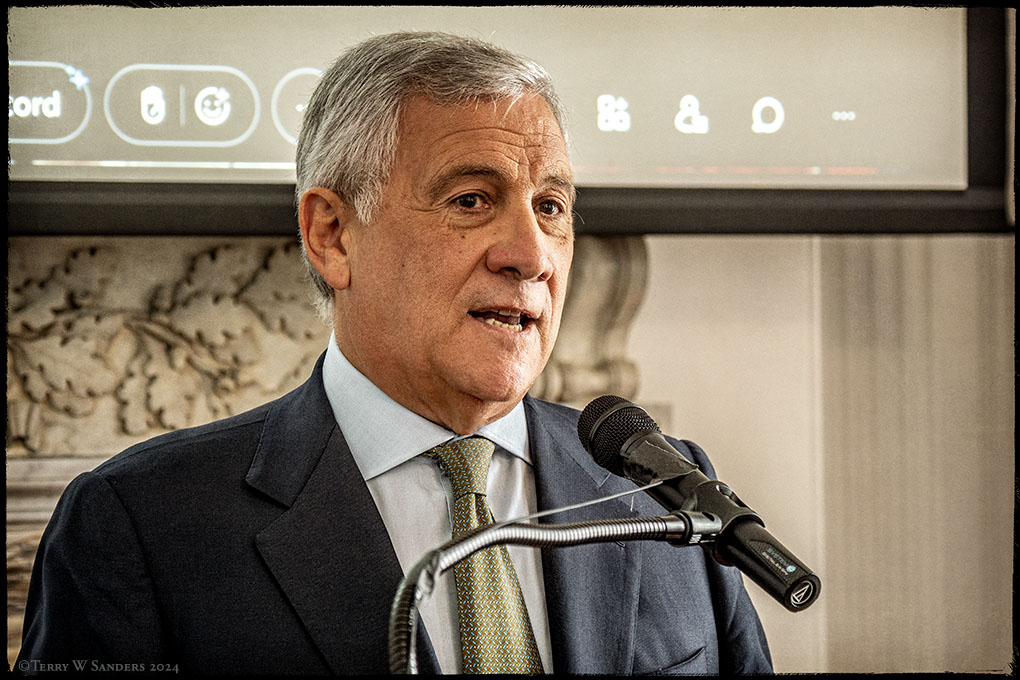Earlier today, the Consulate General of Italy in Manhattan hosted the inaugural “Giornata dello Sport Italiano nel Mondo” (roughly translated “Worldwide Italian Sports Day”), an initiative of the Italian Ministry of Foreign Affairs. “We are here because we have decided that our foreign policy should not just be carried out by our ministers and diplomats,” explained Deputy Prime Minister and Minister of Foreign Affairs Antonio Tajani at the event, flanked by soccer legend Alessandro Del Piero, NBA veteran Danilo Gallinari, and softball powerhouse Isabella Dayton, who led Italy to a European championship this summer.
Tajani went on to share his belief that with positive results, “the world of sport can be a wonderful demonstration of Italy’s current reality.” It’s a case of striking while the iron’s hot, as Italy continues an impressive years-long run of form on the international stage when it comes to sports. In 2021, the Italian men’s national soccer team won its first European championship since 1968, and at the Olympics, that same summer, Italy shocked the world with unexpected victories in track and field, winning gold in the men’s high jump, men’s 100m dash and men’s 4x100m relay, thanks to standout performances from Gianmarco Tamberi, Lamont Marcell Jacobs, and Filippo Tortu, respectively. This year, Jannik Sinner won two Grand Slam titles and became the first Italian tennis player to be ranked as the world No. 1 by the Association of Tennis Professionals, while soccer club Atalanta Bergamo took home the coveted Europa League title with a convincing 3-0 victory against German side Bayer Leverkusen on May 22nd.

While bragging rights are all well and good, the ultimate goal of this event was to emphasize the potential for economic output. “Sports is also industry,” explained Minister Tajani, “it’s also business.” He highlighted Italian companies that do work internationally building athletic swimming pools and running tracks, and that the “international sports sector accounts for about 3% of [Italy’s] GDP.” He talked about boosts to other sectors of the economy, as tourism attracted for hosting international sporting events was “not to be dismissed.”
American owners of Serie A soccer teams joined in via video-conference, sharing their experiences from investing in Italy’s top soccer league. 8 teams in Italy’s top flight are wholly or partially American-owned. Steve Pagliuca, co-owner of Atalanta (and the Boston Celtics, who also won a championship this year), emphasized the overall goal of achieving “competitive balance” and “financial sustainability.” The latter has remained a challenge in Serie A, as recent income statements show an overall deficit of €427 million across the league, with very few teams in the black (Atalanta posted a pre-tax profit of €9.4 million this year).
Gerry Cardinale, founder of Redbird Capital Management, which owns AC Milan, noted the differences in culture surrounding sports-team ownership: “In America, the guys who spend the money to buy the team, they own the team. In Italy, not so straightforward. I think the fans believe that they own the team, and we have a job to deliver for them.” Indeed, the practice of team franchises leaving one city for another, a relatively common practice in the United States, is totally unfathomable in Italy.
Cardinale went on to express being “disappointed in” the Italian government for removing a “tax shield,” which he claimed will eat into the budget for player wages: “we’re going to be, at best, neutral from a competitive standpoint.” He also lamented “not getting a lot of help” from the government in order to “rebuild [the club’s] infrastructure.” Italy faces mounting pressure over the state of its stadiums, as UEFA has issued a warning to Italy over lack of progress in renovations ahead of the 2032 Euro, which Italy will be co-hosting with Turkey. Milan CEO Giorgio Furlani echoed his boss’s complaints: “the government needs to look at us as an industry, not a toy.” Furlani further claimed they can “attract foreign investment” and make use of “soft power” afforded by branding across borders.
Tajani had a literal front row seat to the investors’ complaints, whose video feeds were projected on a screen directly in front of him.












